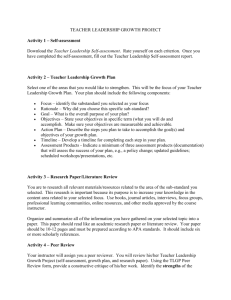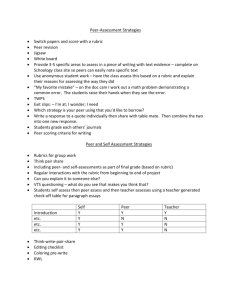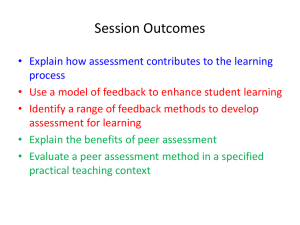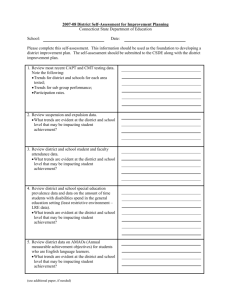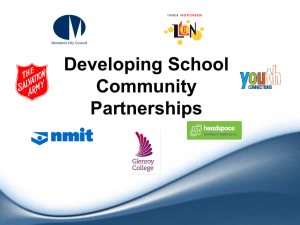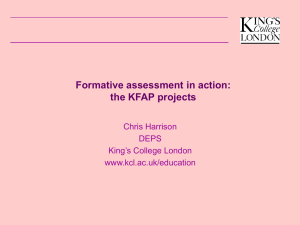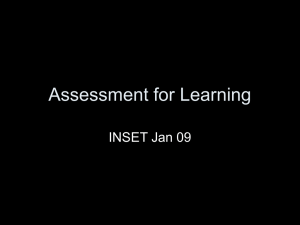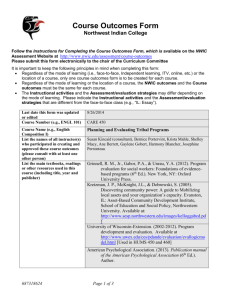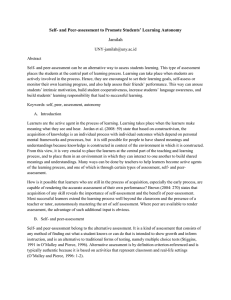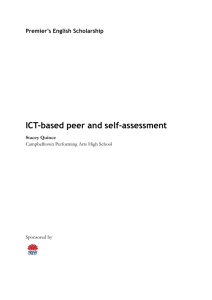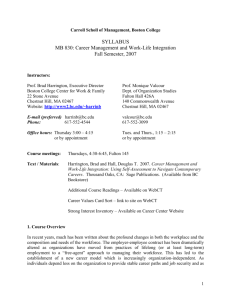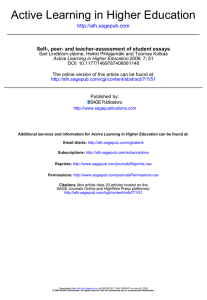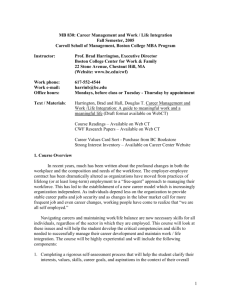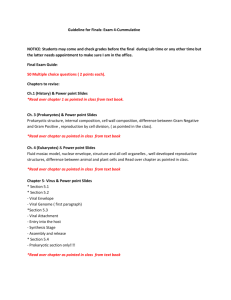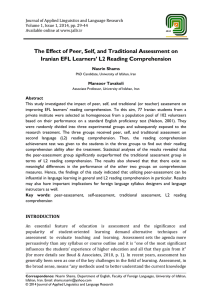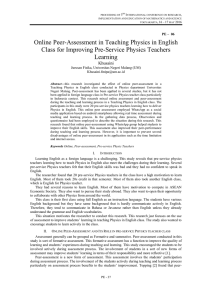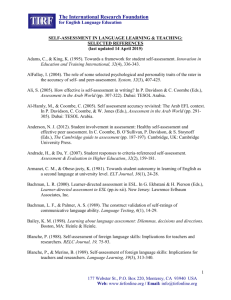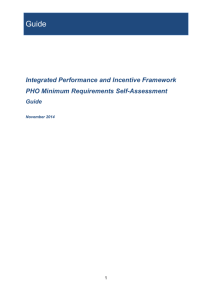Making Good Progress report - Birmingham Grid for Learning
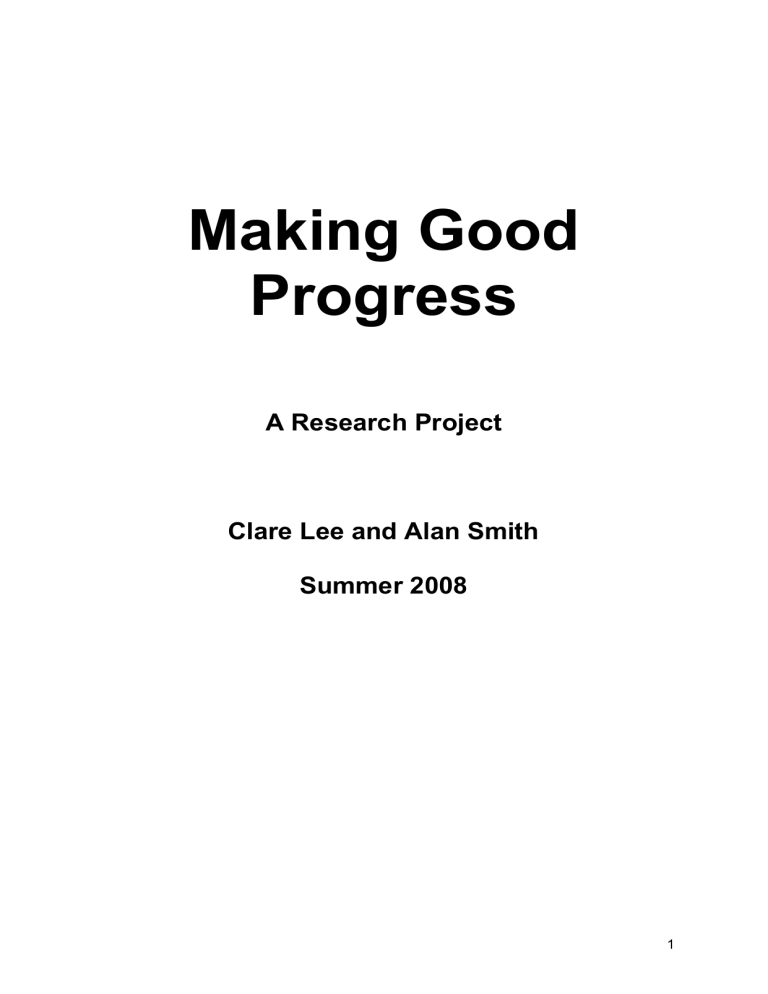
Making Good
Progress
A Research Project
Clare Lee and Alan Smith
Summer 2008
1
Schools involved
Dame Elizabeth Cadbury
Golden Hillock
Heartlands High
Kings Norton Boys
St Thomas Aquinas
Waverley Schools
2
Making Good Progress
The Research Project
The Making Good Progress research took place in six schools in Birmingham from April to
July 2008. The schools were from a variety of areas but were known to have a high contextual value added score, that is they enable their students to progress well academically. The questionnaire was given to every pupil in Year 9 in these six schools gaining responses from about 700 pupils in all. Group interviews were conducted in each school with pupils who were expected to make at least two levels of progress during Key
Stage 3, gaining responses from 50 pupils from all the schools. Further data was gathered from the teachers in the shape of a questionnaire that they completed and an interview that they took part in after the results from the initial questionnaire were collated.
There are very clear results that have come out of analysis of the data from this project. Both the teachers and students have clear ideas about how students learn most effectively. The evidence allows us to say that from the experiences of these students and teachers environments that enable them to make good progress have distinctive characteristics and these are set out in the rest of this report.
The Headlines
This research project has established that in the environment needed to make good progress:
teachers explain well, are helpful, listen to and respect the students. The teachers involve their students in the process of learning.
learning objectives are used to help students know what they have to accomplish in their lessons
a variety of lesson activities are used regularly, including practical and collaborative activities and tasks are structured carefully so that students understand what they have to do.
the role of talk in learning is acknowledged and students are encouraged to engage in dialogue about learning both between teacher and student and between student and student
work is provided that challenges all students
effective feedback is given on all students
’ work helping them to improve and move forward
peer and self assessment are beginning to be developed in a way that empowers students
the students ’ emotional resources are developed so that they are able to deal with mistakes and know that they will succeed through their own efforts.
3
Environments that enable students to make good progress: have teachers that:
explain things well and are helpful
ask questions that challenge the students’ thinking
listen to and respect the students and may give choices about the way that students learn
That school environments that enable students to make good progress have good teachers is no surprise. Good teachers, according to the students both explain things well and listen to and respect the students. They ask challenging questions but they also allow time for students to respond. Good teachers actively listen to the students, ask for explanation and take into account what they hear. Time is an important issue for both students and teachers alike but the students know that if they are to learn, they need time to do so and hate to be rushed through work that they barely understand.
Although many pupils rely heavily on their teachers, in an environment that enables its students to make good progress the students are involved in the learning process and they know that they are themselves the most helpful person when learning. The students are willing to play their part and appreciate teachers that allow them to do so.
use learning objectives in a way that:
helps the students know what the aim of the lesson is and helps them see what they have to accomplish during that lesson
enables the students to focus on the main parts of the lesson and
makes the lesson easier to understand and fit in with other learning
Learning objectives seem to provide a target for the students to aim for so that they know that they are on the right track to complete the learning within the time of the lesson. They enable the students to know when they have successful completed what was asked of them.
Many students who attain two levels of progress agreed that learning objectives provided a target to aim for and helped them focus but many felt that they had no effect on their learning at all. Is this worrying? Learning Objectives that provide a target to aim for show students what they are to learn they do not help them to learn and these students are capable of making that distinction. However if Learning Objectives are discussed in such a way that they enable students to concentrate on the main points of the lesson and provide a framework for learning, fitting it in with other learning then they will be more useful to all students.
use a variety of lesson activities including:
practical tasks that mean that students learn by doing
use tasks that require the students to collaborate, exchange views and ideas and support one another in their learning
4
use structured tasks that enable the students to feel they understand what is required of them
The students said that this is the way that they learn, they learn by doing and by talking about ideas and only when they have sorted out and organised their ideas do they want to commit them to paper. Environments where students make good progress use a variety of different approaches and help build their students’ ability and confidence to take part in whole class and small group discussion and other tasks by structuring the tasks more closely to begin with. They accept that students may misbehave at the start as a consequence of feeling unsure of their own ability to contribute to a new way of working. The teachers know that as these students begin to know what is expected the misbehaviour will lessen and that the whole class will learn more.
Those students who attain two levels of progress, show great preference for lessons where they collaborate with one another. They point to the power of getting more than one viewpoint, greater information and of seeing all around a problem as well as the support that other students offer in uncovering misconceptions and if they encounter a problem. These students do not like to ask their teachers a direct question. They feel that they should be able to understand what the teacher talks about or find answers from the resources offered therefore they would rather ask a peer if they have a question. They resent being asked to work in silence and prefer teachers to come to them and discuss the work informally in small groups.
acknowledge that talk is part of learning as it:
enables students to share ideas and listen to others views
clarifies the work and makes it more understandable
often provides more information and answers questions
The students were clear that talk helped them learn. Some pointed to the fact that teachers explaining and involving them in discussion helped them understand but the majority talked about the need for them to be doing the discussing. They talked about the power of discussing ideas with other students. Once they have some information, either from listening to their teacher or from reading or the internet they were clear that they learned from discussing it. They said discussing with other students allowed them to check their understanding with that of others, hear about parts that they had missed or glossed over and generally clarify their ideas.
The students that make two levels of progress said that discussion made sure that they thought things through and fully clarified their ideas. This meant that they remembered the ideas that they had discussed.
challenge all students by:
asking them to do work that is sometimes difficult but supporting them in doing it
making it clear that mistakes are part of the learning process and that they can learn from them
helping students understand that it is difficult work that enables them to learn.
Those students who attain two levels of progress knew that the work that they were asked to do should be difficult and challenging and that it was ‘just right’ if it was. Some complained
5
that they were given easy work in some lessons and far from building their confidence they felt it wasted their time.
Environments that enable their students to make good progress challenge all their students but support them in meeting that challenge. They talk about mistakes being part of learning and show students that they can make progress when they know not to repeat that mistake.
They emphasise that work that is ‘just right’ for students is interesting because they are learning something new but it sometimes feels difficult. Environments where students make good progress help all their students enjoy the satisfaction of meeting a challenge.
provide feedback on students’ work:
orally and in writing but always giving constructive criticism that gives detailed advice on how the student can improve
at an appropriate time when the students can act on the feedback they receive
is part of a dialogue on learning where the students can ask questions and gain more information.
The students were split on whether they preferred oral feedback or written feedback. They liked oral feedback because it was more likely to be at a time when they could act on it, gave more details about how to improve and meant that the students could enter into a dialogue with their teacher and ask questions. Those that said they preferred written feedback pointed to the fact that they could look back on it and remember the points made and that written feedback was more likely to be focussed on how the work could be improved. Those that did not want written feedback pointed to the time lag between completing the work and getting written feedback.
Students that are making good progress want feedback that will help them learn, they are less concerned about what they have done well. They want feedback that is detailed and that they have time to act on. They are aware that they should look back on advice that they have been given previously the next time that they have similar work but admit that they rarely do. The best feedback is clear about how to improve and is given at a time when the students can ask questions about how to apply the feedback given.
are developing their use of peer and self-assessment as:
they want their students to develop as independent learners and they know that this will help them
it will contribute to an effective dialogue on learning
implementing peer and self-assessment effectively is a major change in the didactic contract for both the teacher and the students and therefore needs time.
Students’ experience of peer and self-assessment was mixed at this time. Many students welcomed its ability to help them see where to improve and how to do so, and welcomed seeing others’ ways of tackling the same task. Others felt that these types of assessment wasted their time, but when this was discussed it was found that they had no time to act on the advice given and therefore it was a waste of time. The students appreciated peerassessment that was used to widen their experience and give them a vision of what success at a task looked like and being given the time to implement the knowledge that they gained.
Students who were progressing well pointed to the fact that they engaged in focused conversations about the task and how to move their learning forward through peerassessment.
6
Selfassessment seemed to mean marking students’ own answers from sheets given out or from answers written on the board and many were concerned that this encouraged cheating especially when the marks were collected in by the teacher. Self-assessment as an important life skill was not recognised by the students, indicating that this has still to be developed by the schools in the survey.
Peer and self-assessment are part of the change from over- dependency on teachers to tell students everything they have to do and everything they have to think, to independent responsible students. Both students and teachers find this desirable but risky, the teachers are reluctant to hand over more control to the students as they may not take it and the students are reluctant to take on control as they are not used to it and who will they blame if it all goes wrong? Peer-assessment also sits uneasily within a system that is focused on grades and tracking. If the only reason to complete a piece of work is to gain a better grade than others in the class why waste time with peer-assessment? Peer-assessment is about improving, about learning what assessment criteria really mean and being involved in the whole process of knowing what quality work looks like. It is entirely formative and therefore focused on an improvement process not on a summative grade.
help their students to learn by:
having teachers that are well prepared, structure lessons well and are worth listening to
encouraging the use of exciting and fun activities, such as ICT and out of school activities, as part of the lesson mix
promote the idea that the students will succeed through their own hard work.
Students want to know what they are learning and how it will fit in with other learning experiences but they also want to know what they will be expected to do and they particularly value a teacher that explains how their lesson will be structured and then sticks to that structure. Students want a mix of activities in their lessons, with practical and collaborative activities being used as a frequent part of the mix. Students who were making good progress said that they are asked to write too much and too often. They understand that writing can help them learn by asking them to organise their ideas, to formally and clearly record important concepts and to be creative but it is too often used to record routine facts that could be accessed in other ways. Environments where students are making good progress only ask their students to write when that is both necessary and prepared for, they make all writing high-quality, useful writing.
In environments where students make good progress the students know that they are the most important actor in their own success. When they work hard, pay attention to the right things and act on the feedback they receive they know that they will succeed. They have high expectations of themselves and are willing to put in the extra effort required to meet challenges. They know that easy, repetitive work wastes their time and does not enable them to learn. Their schools use ICT extensively to help students learn and use out-ofschool activities to enable to students to apply the knowledge they have built up in school in the real world.
With thanks to Dame Elizabeth Cadbury, Golden Hillock, Heartlands, Kings Norton Boys, St Thomas
Aquinas and Waverley Schools.
7
